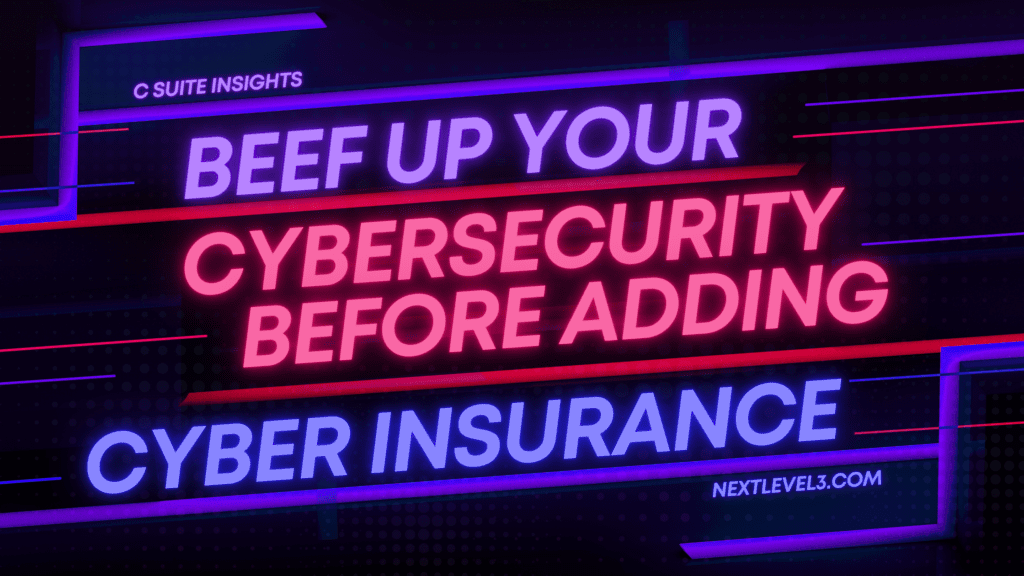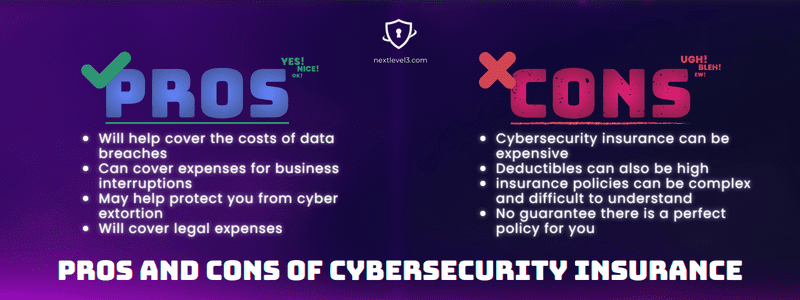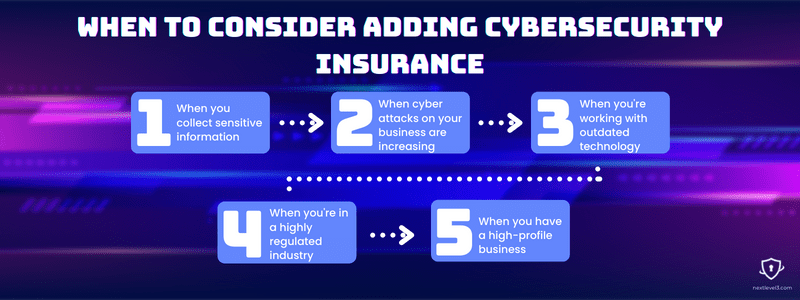
Considering cybersecurity insurance? Here’s what a cybersecurity company thinks you should consider first.
You likely already have insurance to protect your physical property in the event of an accident or natural disaster. But what about your digital property? If you’re not insured against cybercrime yet, you may be at risk for a data breach or other incident that could have a serious financial impact on your business. If you want to protect your digital assets, investing in cybersecurity insurance may be a smart move. Here’s what our cybersecurity company recommends starting with.
What is cybersecurity insurance?
Cybersecurity insurance protects businesses from the financial losses that can occur as a result of a cyber attack. It can cover the cost of restoring lost or stolen data, as well as repair any damage to reputation or customer relations. Cybersecurity insurance can also help pay for the expenses associated with investigating and prosecuting the hackers who carried out the attack.
In recent years, the number of cyber attacks has grown exponentially, along with the cost of damages associated with these attacks. As a result, many businesses are choosing to purchase cybersecurity insurance in order to protect themselves from the financial impacts of an attack.
Pros and cons of cybersecurity insurance
Cybersecurity insurance can be extremely valuable to your business in the event of a cybersecurity breach. However, it can also come with a few drawbacks. Let’s take a look at some of the top pros and cons of cybersecurity insurance.

Pros
While the concept of cybersecurity insurance is still relatively new, it is increasingly being seen as an essential part of risk management for businesses of all sizes. Cybersecurity insurance offers many benefits in the event of a cyber attack. For example, it can help cover the cost of:
- Data breaches, including the cost of notification, credit monitoring, and identity theft protection for affected customers.
- Business interruption, including lost revenue and expenses related to recovery from a data breach or cyber attack.
- Cyber extortion, including ransom payments and expenses related to recovery from a ransomware attack.
- Legal expenses, including defense costs and damages awarded in lawsuits arising from a data breach or other cyber incident.
Cons
While cybersecurity insurance can offer some protection against the financial consequences of a data breach, it is important to consider the potential drawbacks before purchasing a policy. Here are some other challenges that you may face when shopping for a cybersecurity insurance policy:
- Cybersecurity insurance can be expensive, and the cost of premiums is increasing.
- Deductibles can also be high, meaning that you may still have to pay a significant amount out-of-pocket if you experience a data breach.
- Cybersecurity insurance policies can be complex and difficult to understand. This can make it challenging to know exactly what is covered by your policy.
- There is no guarantee you will be able to find a policy that covers all of the potential risks associated with your business. Cybersecurity insurance is still a relatively new field, and coverage options can vary significantly from one insurer to the next.
There are undoubtedly many important considerations to keep in mind before purchasing a cybersecurity insurance policy. With the increasing frequency – and cost – of cyber attacks over the past ten years, you may find that you that the potential benefits outweigh the costs and risks. In fact, the average cost of a data breach increased to $4.35 million in 2022.
Things to consider before purchasing cybersecurity insurance
Do you have MFA in place?
Multi-factor authentication is an important cybersecurity measure that requires users to provide multiple pieces of information in order to gain access to a system. This can include something that the user knows, like a password, as well as something that the user has, like a physical token or a biometric identifier.
The use of multiple factors makes it more difficult for unauthorized users to access the system, especially when used in conjunction with other security measures such as firewalls and intrusion detection systems. Almost any cybersecurity company you find will require its clients to have multi-factor authentication in place before providing insurance coverage.
This is because the presence of multi-factor authentication lowers the chances of a successful cyberattack in the first place, which reduces risk for the insurance company. Multi-factor authentication can also provide valuable evidence for the insurance company in the event an attack does happen
In short, multi-factor authentication is an important tool for protecting your business’ systems and data, and it is increasingly being required by cybersecurity insurance companies in their standard minimums. Also, as cyber insurance companies look to increase their policy minimums to require enhanced MFA extensions like account protection locking, make sure you have at least multi-factor authentication now as a part of your basic tech stack.
Do you have mobile device management software?
In today’s business world, mobile devices are an essential part of daily operations. However, these devices can also pose a security risk if they are not properly managed. Mobile device management software helps to mitigate this risk by providing a way to remotely control and monitor employee devices.
This cybersecurity software can be used to enforce security policies, such as password requirements and data encryption. It can also track device usage and location. In addition, mobile device management software can be used to wipe sensitive data from lost or stolen devices.
By implementing a mobile device management software solution, businesses can protect their data and ensure their employees are using their devices in a safe and secure manner. Similar to MFA, mobile device management software will most likely be required by the cybersecurity company you choose to purchase insurance from.
Do you have preventative measures against phishing attacks?
Phishing is a type of online scam in which criminals pose as legitimate organizations in order to obtain personal information from unsuspecting victims. These scams often take the form of fake emails or websites that appear to be from actual well-known businesses like banks or retailers.
Victims are typically lured in by promises of special deals or discounts, and are then asked to provide sensitive information, such as credit card or Social Security numbers. Phishing scams can be very difficult to spot, but there are several steps users can take to protect themselves. First and foremost, it is important to be aware of the potential for phishing scams in the first place. Secondly, users should never click on email links or attachments from unknown senders.
Finally, if an email or website looks suspicious, it is always best to err on the side of caution and contact the supposed organization directly to verify its legitimacy. A cybersecurity company will recommend that you establish preventative measures against phishing attacks before purchasing an insurance policy.
Do you have the right compliances and standards in place?
There are many cybersecurity compliances and standards that a company should have in place, depending on the type of business it conducts. Some of the most important ones include the Payment Card Industry Data Security Standard (PCI DSS), the Health Insurance Portability and Accountability Act (HIPAA), and the Sarbanes-Oxley Act (SOX).
Each of these standards has specific requirements that must be met in order to ensure sensitive information is stored safely. For example, the PCI DSS requires companies to maintain a secure network, protect cardholder data, implement strong access controls, and regularly monitor and test their systems.
Similarly, HIPAA requires companies to safeguard patient health information while SOX imposes strict requirements for financial reporting. By adhering to these and other cybersecurity compliances and standards, companies can reduce the risk of data breaches and other cyber threats.
When to consider adding cybersecurity insurance
Are you considering cybersecurity insurance for your small business? Here are some examples of circumstances in which a business of any size could benefit from cybersecurity insurance.

When you collect highly sensitive information
If your business collects sensitive information of any kind, you should consider protecting it with cybersecurity insurance. Any sensitive data your business stores on its employee to customers – regardless of the size of your business could be used by hackers to commit fraud or identity theft.
For example, most companies collect and store highly sensitive billing information from their customers like credit card numbers or bank account information, along with EINs. Also, any company that employs staff collects banking information, Social Security numbers, home addresses, and other personally identifiable information. Companies in the healthcare field may also collect and store even more sensitive data like medical records and insurance information.
Cybersecurity insurance covers the costs of investigating and repairing any damage caused by a data breach, as well as providing liability protection in the event that customers or clients suffer any harm as a result.
When cyber attacks on your small business are increasing
Have you experienced a cyber attack already? Or maybe several attacks with increasing frequency? If so, you should consider investing in cybersecurity insurance. Cyber attacks are getting more common as technology advances and more people work from home rather than in a secure office.
If you’re already looking to update your tech stack, you may have a preconceived notion that cybersecurity solutions are made mostly for enterprises, but small businesses are at risk, too. Organizations with 1-250 employees have the highest malicious email rate – 1 in 323.
When you’re working with old or outdated technology
As our lives increasingly move online, it’s more important than ever to make sure our devices and software are up-to-date. Unfortunately, using outdated technology can open us up to a number of cybersecurity risks.
For example, older computers may not have the necessary security features to protect against newer types of viruses and malware. In addition, outdated software may contain known vulnerabilities that can be exploited by hackers. Outdated operating systems may also lack support from the manufacturer, making it difficult to apply critical security patches.
As a result, it’s important to regularly update your computer and cybersecurity software to help reduce the risk of being hacked. Additionally, consider installing malware detection software to help protect your devices from viruses. That way, you can keep your information as safe and secure as possible.
When you’re in a highly regulated industry
In recent years, cyber attacks have become an increasingly prevalent concern for businesses in all industries. However, companies in highly regulated industries like healthcare, finance, and government are at an especially high risk for cybercrime. This is due to the sensitive nature of the information they handle.
A data breach in one of these industries can have serious consequences for a business, including financial losses, damage to reputation, and legal penalties. To protect themselves from cyber attacks, businesses in highly regulated industries must invest in strong cybersecurity measures.
This includes installing robust firewalls, encrypting data, and providing employees with security training. By taking these steps, businesses can reduce their vulnerability to cybercrime and safeguard their valuable assets.
When you have a high-profile business
Any business that relies heavily on technology is at risk of a cyber attack. However, businesses that are prominent in the public eye are often prime targets for hackers. This is because hackers can gain a great deal of notoriety by successfully breaching the security of a well-known company.
In addition, high-profile businesses often have sensitive client information, making them even more attractive to criminals. As a result, it is essential for companies with a public profile to invest in strong cybersecurity measures.
This includes implementing firewalls and encrypting sensitive data. Businesses that take these precautions can protect themselves from the substantial risks associated with being in the public eye.
Make sure your business is safe with the help of a cybersecurity company
As more companies increasingly rely on technology, cybersecurity insurance is becoming an essential security measure. Nearly every small business could benefit from having cybersecurity insurance to protect themselves and their customers. However, remember that you need to have strong cybersecurity protocols and measures already in place before you can qualify for most insurance policies. In the meantime, you may want to check with your business insurance provider to see if you qualify for cyber liability insurance to get started with interim protection.
If you’re looking for the help of a cybersecurity company, it’s important to partner with a reputable and experienced one like Next Level3 for next-gen solutions. Even if you’re not ready to implement our account locking solution or need consulting services, NL3 can help you find vulnerabilities that you’ll need to address in order to meet the cybersecurity insurance policy minimums in order to quality for underwriting.
Contact us today to learn more about how we can help keep your business safe from data breaches, malware, and other online threats.
